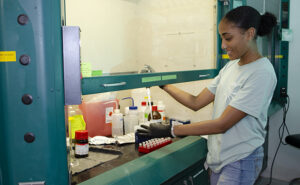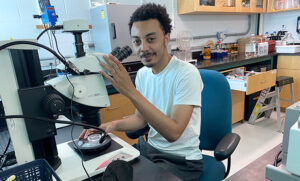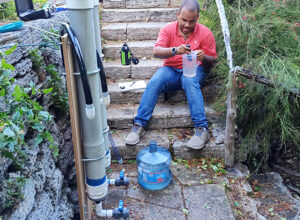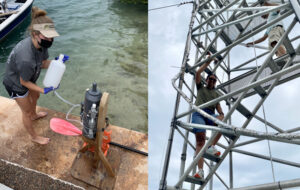‘An Amazing Place to Learn and Grow’

This year, seventeen Bermudian students were selected for summer internships through the BIOS Bermuda Program, which offers participants the opportunity to conduct research projects under the mentorship of BIOS faculty and scientific staff. Jalisa Caines, a 2022 Bermuda Program Gray Intern, works in the Microbial Ecology Laboratory on a project investigating the expansion of the oxygen minimum zone at Devil’s Hole in Harrington Sound, Bermuda, and its effect on the nitrogen cycle.
The Bermuda Program, part of BIOS’s Ocean Academy suite of local education programs, has been providing internship opportunities to Bermudian students, aged 18 and older, since 1976. In that time, more than 250 summer internship placements have been provided to young Bermudians. The program pairs students with BIOS faculty and scientific staff, who serve as mentors for participants while they conduct research projects in the fields of marine and atmospheric science.
Each year, BIOS chooses qualified students to receive paid Bermuda Program fellowships, which include a stipend and laboratory expenses to support their research projects. The internships are full-time for a period of four or eight weeks, and include an opportunity for participants to present their research in a traditional academic seminar.

Jihad Muhammad, a first year Bermuda Program intern, works in the Invertebrate Physiology Laboratory optimizing a protocol being used to investigate the effects of ocean acidification on the shells of pteropods, or sea snails.
For 2022, BIOS selected seventeen students as Bermuda Program interns. Additionally, two of these students have been named as Bermuda Program Gray Interns based on their academic merit, leadership potential, and ability to serve as ambassadors for BIOS education programs throughout Bermuda’s communities.
Caroline Alexander
- 22, enrolled in a one-year Master of Science (MSc) degree in climate change at University College London (England)
- 2020 Bermuda Program intern
- Mentor: Mark Guishard (Bermuda Weather Service, BIOS adjunct faculty)
- Project: I am investigating Bermuda’s water supply and how it may be influenced by future climate change. I am primarily performing statistical analyses using existing groundwater and climate data for Bermuda, as well as projections for future sea levels and precipitation, to see how the water supply may change. This research will be used to help inform part two of the Bermuda Climate Change Report being compiled by my mentor. I am also using this research for my master’s dissertation.
- “I applied for a Bermuda Program internship this year because I wanted to have a Bermuda-centered dissertation, and working on the Bermuda Climate Change Report allowed me to accomplish this. It was also a wonderful opportunity to work with Mark [Guishard] and be part of a research project that will inform Bermuda’s leaders on climate change.”
Jalisa Caines
- 19, rising junior in biological science (specialization in environmental biology) at Ontario Tech University (Canada)
- 2022 Bermuda Program Gray Intern
- Mentor: Rachel Parsons (BIOS)
- Project: I’m investigating the expansion of the oxygen minimum zone at Devil’s Hole in Harrington Sound, Bermuda to observe the effects on the nitrogen cycle. Specifically, I’m focusing on a prokaryotic microorganism called Thaumarchaeota and a bacterium called Pseudomonas, both of which play a role in the nitrogen cycle. I will be measuring the abundance of these microbes at different depths from samples collected from 2016 to the present.
- “I wanted to participate in a Bermuda Program internship to apply my scientific knowledge to research projects, meet other young scientists and experienced scientists that can help me reach my goals, and learn more about the marine environment.”
Daque Davis
- 19, rising second year student at Bermuda College
- First year Bermuda Program intern
- Mentors: Samantha de Putron and Yvonne Sawall (BIOS)
- Project: I will be testing the capabilities of newly upgraded mesocosms in the Bermuda Marine Mesocosm Facility with respect to temperature regulation and carbon dioxide additions that mimic ocean acidification, as well as water quality testing. I will also be helping with coral physiology measurements that will serve as a baseline for upcoming coral thermal tolerance experiments.
- “By participating in the Bermuda Program, I hope to learn more about ocean science, climate change and how to reduce my carbon footprint. I aspire to become a shark biologist.

Nicholas Davis, a first year Bermuda Program intern, takes water quality measurements as part of his study into whether the First Flush Diverter can be used to prevent sediment accumulation in residential rainwater tanks.
Nicholas Davis
- 22, recent graduate of Bermuda College with an associate’s degree in chemistry
- First year Bermuda Program intern, 2021 BIOS Climate Workshop participant
- Mentor: Tarik Smith, Koom Consulting
- Project: My research looked at whether the First Flush Diverter [a plumbing assembly that routes the first pass of water away from the catchment system] could be used to generate quantitative data on patterns of sediment accumulation collected from the rooftops of Bermuda houses. This sediment can find its way into residential rainwater tanks during periods of heavy rainfall, causing the buildup of contaminants such as metals and bacteria. Data from this research can be used to determine the value of the First Flush Diverter as a tool for mediating sediment accumulation in rainwater tanks.
- “Having the opportunity to participate in this amazing internship over the summer, working with actual scientists, gives Bermudians like me the opportunity to explore their desire to become scientists in the future.”
Saxon Davis
- 20, rising third year student in biology at the University of British Columbia (Vancouver, Canada)
- 2022 Bermuda Program Gray Intern, 2021 Bermuda Program intern, 2020 Ocean Academy intern
- Mentor: Julius Barsi (BIOS)
- Project: My internship this summer involved analyzing data that was already collected on gene expression in purple sea urchins. We are analyzing these data to determine which genes are differentially expressed and, consequently, if they are “up regulated” [increased in quantity] or “down regulated” [decreased in quantity]. We can then use the gene expression profiles of these differentially expressed genes to determine their order of expression (which are expressed first during sea urchin development) and to make a gene map.
- “I wanted to be involved with the Bermuda Program again this year and, specifically, in an internship with Julius Barsi, as I have become more interested in genetics, including vertebrate and invertebrate embryo development, while I continue my degree. This seemed like the perfect project to obtain good research experience in the genetics field.”

Robin Stempel (left), a first year Bermuda Program intern, handles water samples collected in the field as one component of a larger investigation into the biodiversity of recovering seagrass beds in Bermuda. Hayley Dill (right), also a first year Bermuda Program intern, climbs up the tower at the Tudor Hill Marine Atmospheric Observatory during her study of Bermuda’s air quality and how sources of pollutants can be correlated with meteorological data.
Hayley Dill
- 22, rising senior in earth science at St. Francis Xavier University (Canada)
- First year Bermuda Program intern
- Mentor: Andrew Peters (BIOS)
- Project: I’m working on two projects related to air quality in Bermuda, the first at Tudor Hill Marine Atmospheric Observatory and the second at Fort Prospect. Both sites collect data for air pollutants such as nitric oxide, nitrogen dioxide, and sulfur dioxide, as well as particulate matter and meteorological data. I’m creating wind roses [graphical charts that characterize the speed and direction of winds] and analyzing meteorological data at both locations. This allows us to better understand and explain the patterns we see in the data regarding air quality in Bermuda, and to pinpoint the sources of pollutants and make correlations with meteorological data.
- “This internship has given me the opportunity to pursue my goal of researching sustainable climate change solutions. At the root of these solutions is first visually describing the data to understand and explain the changing patterns we are seeing and experiencing. This internship was the perfect start in learning exactly how to carry out this fundamental step in environmental research.”
Maya Leighton
- 19, first year transfer student in oceanography at University of North Carolina Wilmington (U.S.)
- 2021 Bermuda Program intern, 2020 Ocean Academy Saturday Intern Program participant
- Mentor: Rachel Parsons (BIOS)
- Project: I’m investigating how sea surface microbial communities respond to carbon compounds produced by the macroalgae Sargassum in the presence and absence of nutrients, such as phosphorus and nitrogen, that are naturally limited in the Sargasso Sea. Specifically, I’m studying the SAR11 and Rhodobacteraceae microorganisms to help understand how Sargassum can survive in nutrient-deficient waters. Sargassum serves as a home to many marine species. In order to protect the wider Sargasso Sea ecosystem, it is critical to understand how growth-limiting nutrients affect the microbial community.
- “I wanted to participate in a second Bermuda Program internship because I love working at BIOS. Not only did I have the opportunity to conduct research relevant to my academic interests and goals, but BIOS is a big community full of like-minded people from all over the world. It has been such an amazing place for me to learn and grow—academically, personally, and professionally—before going away to university. I wouldn’t choose to do any other work this summer than hands-on research at BIOS!”
Destiny Matthie
- 17, rising first year student in marine biology at Plymouth University (England)
- 2018 BIOS Work Experience Program participant
- Mentor: Rachel Parsons (BIOS)
- Project: My research involved counting, logging, plotting, and establishing patterns in the numbers of bacteria in both inshore and offshore waters in connection with the Bermuda Atlantic Time-series Study (BATS) program. These data can be applied to many different research projects, such as inshore versus offshore biodiversity, location-specific ocean health studies, bacterial population tracking, or researching specific bacterial species.
- “Getting to work in a marine lab environment for an extended period of time and experiencing the cooperative atmosphere that comes with it was the perfect way to enter the marine science research field.”
Jihad Muhammad
- 21, first year student in marine biology at Bermuda College
- 2020 Ocean Academy Saturday Intern Program participant
- Mentor: Amy Maas (BIOS)
- Project: I worked on optimizing a protocol that is being used as part of a U.S. National Oceanic and Atmospheric Administration project investigating the effects of ocean acidification on the shells of pteropods, or sea snails. After photographing the pteropod shells under a microscope, I used image processing software to determine how to correct for light level variations in the images. I then tested whether long-term storage in bleach affected pteropod shells by comparing transparency measurements from this year to measurements taken from the same shells in 2021.
- “I hoped to gain more experience operating in a lab and handling equipment. This internship has impacted me in a way that makes me not only want to come back, but also be part of more challenging research in the future.”
Tomasina Pearman
- 17, senior year of high school, Westminster School (U.S.)
- First year Bermuda Program intern
- Mentor: Julius Barsi (BIOS)
- Project: I’m looking at gene expression in Strongylocentrotus purpuratus, the purple sea urchin. My goal is to analyze a data set of all the genes in this organism to pinpoint which are differentially expressed, or activated within a cell that defines their purpose, such as becoming pigment cells or gut cells. Once we determine which genes are differentially expressed, this information can help further the studies of gene regulatory networks. Maps of gene regulation will help scientists visualize the steps required by complex organisms to arise from a single cell.
- “Working as a Bermuda Program intern allowed me to see what it is like to work in the scientific field in a way that I would never have experienced at school. I particularly liked discussing the many possibilities of working in a career in molecular biology or genetics. These are areas of study that truly offer so many questions to explore and they are highly applicable to many fields outside of fundamental sciences.”
Nasir Rudolph
- 22, rising third year student in marine affairs at the University of Miami (U.S.)
- 2020 Ocean Academy intern
- Mentor: Tim Noyes (BIOS)
- Project: My research project focused on investigating the species abundance, diversity, and richness of deep-sea sharks in Bermuda. We used Baited Remote Underwater Video Systems (BRUVs) in depths ranging from 1000 to 3500 feet (300 to 1100 meters) to collect video of deep-sea sharks and their behavior. The goal is to use these findings to support future legislation regarding shark protection and the creation of marine protected areas in Bermuda’s deep waters. This project marks one of the first times that video has been collected from these depths, so it is important to create an initial population outlook that future studies can be compared with.
- “I thoroughly enjoyed my Bermuda Program internship. It reinforced some of what I learned in school while narrowing down which parts of marine science I enjoy. Seeing both the field and the lab portions of marine science was very interesting and will be beneficial in my future endeavors. Finding species that have never been identified in Bermuda or seen at certain depths was fascinating and highlights the importance of this research.”
Kristy Sanchez
- 18, rising first year student in biology at McGill University (Canada)
- First year Bermuda Program intern, previous volunteer intern
- Mentor: Rachel Parsons (BIOS)
- Project: I am researching viral abundance at the Bermuda Atlantic Time-series Study (BATS) site and adding 2021 data to the time-series. My research involves converting samples into microscope slides, making manual microscopy counts, and using software to create automated counts of viruses. I have also been redesigning standard lab protocols and software programs using more efficient methods. Adding to the long-standing BATS data set will continue providing insight into oceanic viruses and how they affect the marine microbial community which, in turn, influences marine biogeochemical cycles.
- “I want my career to involve working in a lab environment, one that is positive and dynamic just like BIOS. With the Bermuda Program, I have the opportunity for my career to start exactly where I want it to end: in a research lab, with interesting projects and great people.”
Robin Stempel
- 21, rising third year student in biochemistry at High Point University (U.S.)
- First year Bermuda Program intern
- Mentor: Tim Noyes and Andreas Ratteray (BIOS)
- Project: My work at BIOS investigated the biodiversity of recovering seagrass beds using visual surveying methods and a new technique involving environmental DNA. This is vital research because seagrass beds act as nursing grounds for juvenile fish for other marine ecosystems such as coral reefs. They also are important for carbon storage. With the decline in seagrass over the last couple decades in Bermuda, there is a strong need to evaluate the biodiversity of seagrass ecosystems. This will allow us to understand if current methods for seagrass restoration, such as turtle exclusion cages, can actually improve the biodiversity benefits provided by seagrass beds as they recover.
- “I have never had experience doing field work, so to be able to pair that with using high-quality lab instruments on a project that is relevant to helping Bermuda’s environment has been incredible. I have met amazing people in the Bermuda Program, as well as from other international programs, that bring unique experiences to BIOS.”
Jasper Thomas
- 21, rising sophomore in marine biology at Dalhousie University (Canada)
- 2021 Bermuda Program intern, 2020 Ocean Academy intern, Marine Science Internship participant
- Mentor: Robbie Smith (Bermuda Aquarium, Museum, and Zoo; BIOS adjunct faculty)
- Project: My project is focused on surveying coastal areas around Bermuda to see what species of fish, and how many individuals of each species, are found in those areas. We conducted visual surveys, which involved swimming along a transect line and recording the number of fishes we saw and their estimated sizes. Once all the data are processed, they will be used as part of the ongoing Bermuda Reef Ecosystem Assessment and Monitoring (BREAM) project.
- “The Bermuda Program has been essential in building my confidence in marine science research and helping me decide that I want to study fish as a career. Throughout my three years at BIOS, I’ve made connections that I hope to keep throughout my career. I’m extremely grateful to have been able to take part in the Bermuda Program.”
Keagan Woolley
- 21, rising sophomore at Rollins College (U.S.)
- First year Bermuda Program intern
- Mentor: Tim Noyes (BIOS)
- Project: My research is focused on camera optimization for deep-sea research. I will be comparing the current Baited Remote Underwater Video System (BRUVS), which uses a GoPro Hero 7 camera, to a new prototype camera, the Maka Niu, which was developed by a team at the Massachusetts Institute of Technology. The Maka Niu is a low-cost camera that allows developing nations to engage in deep-sea exploration.
- “The Bermuda Program internship allowed me to work on a current marine biology project relevant to an area of concern and value to Bermuda.”
Treiana Zuill
- 20, rising first year doctoral student in biological sciences at Florida International University (U.S.)
- 2021 Bermuda Program intern, 2020 Ocean Academy intern, 2019 Bermuda Program intern
- Mentor: Robbie Smith (Bermuda Aquarium, Museum, and Zoo; BIOS adjunct faculty)
- Project: My research project focused on obtaining a quantifiable understanding of Bermuda’s inshore fish populations. To do this we conducted several visual 30-meter surveys across many inshore, as well as some offshore, locations across the island. The goal is for these data to be used in making scientifically guided decisions regarding Bermuda’s fish populations and the establishment of more inshore marine protected areas around the island.
- “This summer was particularly notable given the skills that I’ve learned. Whereas in the past I have been able to build onto my skills as a scientist working in the field, this summer I got to experience the other side of the coin and understand the importance of not only being able to collect good data, but process it as well. Much of this summer was spent analyzing three years’ worth of fish data, and the learning curve I experienced was truly invaluable in light of wanting to become a well-rounded scientist.”
For more information on the Bermuda Program, please visit www.bios.edu/education/bermuda-program
